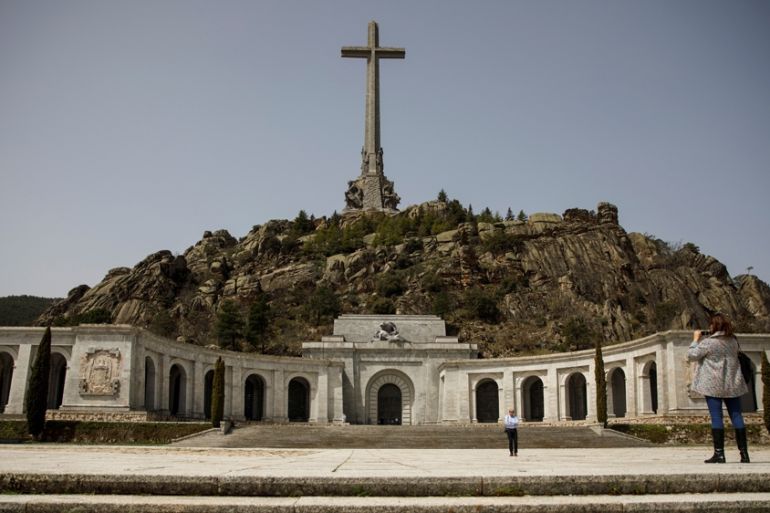Spain takes steps to exhume Franco’s remains
Francisco Franco’s family says it will take charge of the late dictator’s remains once they are exhumed.

Spain’s government has passed a decree to remove the remains of the country’s former dictator Francisco Franco from a grand mausoleum where he has been buried for 43 years.
Transforming the Valle de los Caidos (Valley of the Fallen) site, located on a mountainside near the capital, Madrid, into a memorial for victims of the Spanish Civil War is a long-standing ambition of the Socialist Party, which returned to office in June.
On Friday, the government issued an emergency decree that would give authorities permission to carry out the exhumation without objections or legal claims from Franco’s descendants after negotiations with his seven grandchildren broke down.
The parliament still needs to vote on the move, which is expected to pass with the support of most of the country’s political parties. The People’s Party (PP) is set to abstain, as is the centre-right Ciudadnos (Citizens) party, which objects to the use of the emergency decree.
Deputy Prime Minister Carmen Calvo said the move would allow the Valley of the Fallen to become “a place of commemoration, remembrance and homage” to those who died during the civil war.
The monument includes the remains of about 400 other people who died during the civil war from both the Republican and Nationalist sides. However, the presence of Franco’s remains, along with the fact that he conceived the site, makes its place as a memorial controversial.
“Only the mortal remains of people who died as a result of the Spanish Civil War will lie in the Valley of the Fallen,” Calvo told a news conference on Friday.
Spain’s Prime Minister, Pedro Sanchez, said on Twitter that the move will give victims of the war their dignity back.
“A forward-looking country should be at peace with its past. We are going to exhume Franco’s remains with full jurisprudence and by listening to the other parliamentary groups. The government is acting calmy to give back dignity and democracy to the victims of Francoism,” said Sanchez on Twitter.
Un país que mira al futuro debe estar en paz con su pasado. Vamos a exhumar los restos de Franco con todas las garantías y escuchando al resto de grupos parlamentarios. El #Gobierno actúa con serenidad para devolver la dignidad a las víctimas del franquismo y a la #democracia. pic.twitter.com/hNuKRzAO39
— Pedro Sánchez (@sanchezcastejon) August 24, 2018
Digging up ghosts
Franco ruled Spain from 1939 until his death in 1975, during which time tens of thousands of people were killed and imprisoned in efforts to wipe out dissent following the brutal civil war between Republicans and Franco’s Nationalists.
More than 40 years after his death, the Franco-era remains a divisive topic in the country.
The mausoleum has long been a pilgrimage site for far-right groups and Franco’s tomb is rarely without fresh flowers.
Pablo Casado, the PP leader, said on Thursday that the move was unnecessary, saying: “We don’t want to dig up ghosts we have happily forgotten.”
Franco’s family has said that they will take charge of the remains once they have been exhumed.
“Of course we will take charge of the remains of my grandfather. We won’t leave them in the hands of the government,” Francis Franco, the former leader’s grandson told Spanish newspaper La Razon in an interview published on Saturday.
For others, the removal of the remains is a necessary step towards reconciliation.
“Now is the time to turn a page,” Eduardo, a 25-year old from the Canary Islands told the Reuters news agency.
“It’s good to go ahead with the exhumation and to convert that place into somewhere for everyone and not just for one faction”.
![During Franco's rule, tens of thousands of people were killed in attempts to wipe out dissent [Susana Vera/Reuters]](/wp-content/uploads/2018/08/1dde7369702548fb87fc7dd3d1c0ad9b_18.jpeg)